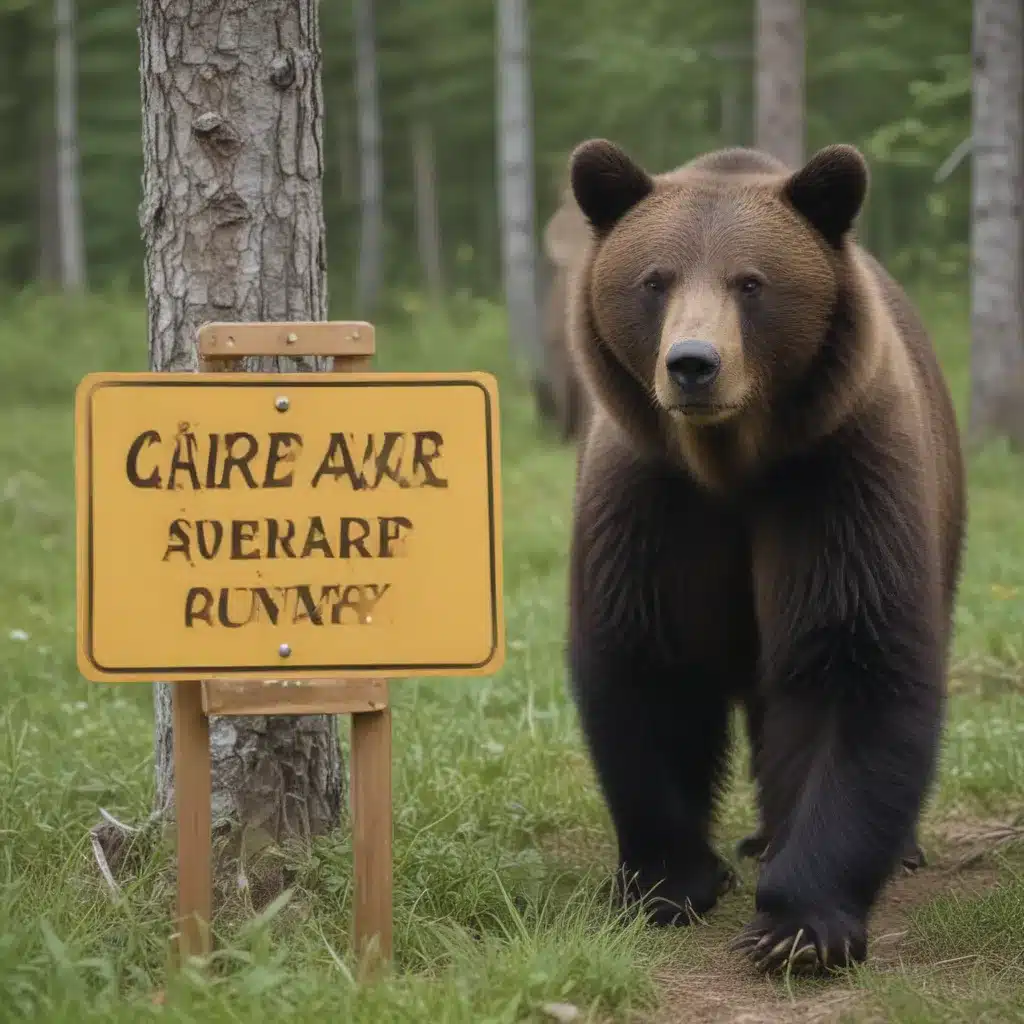
Tread Lightly, Campers: Encountering Bears in the Scottish Highlands
Ah, the Scottish Highlands – a rugged, untamed wilderness that beckons adventurers and nature lovers alike. As I pack my bags for my upcoming camping trip, I can’t help but feel a mix of excitement and trepidation. You see, the Highlands are home to a formidable resident – the mighty black bear. These intelligent and resourceful creatures have roamed these lands long before humans arrived, and it’s our responsibility to ensure we coexist peacefully.
Understanding the Black Bear’s Habits and Habitat
Before I delve into the nitty-gritty of bear-safe camping, let’s take a moment to appreciate these fascinating creatures. Black bears, despite their name, can actually come in a variety of colors, from the classic jet black to the distinctive cinnamon and even the elusive white “spirit” bear. These animals are true omnivores, with a diet that includes everything from berries and nuts to small mammals and even the occasional fish.
In the Scottish Highlands, black bears are particularly active during the late summer and fall months, as they frantically forage to pack on the pounds before the long, harsh winter. During this time, they can spend up to 20 hours a day searching for food, making them especially eager to seek out easy meals in campgrounds and picnic areas. As the Colorado Parks and Wildlife department warns, “Once bears learn to follow their super-sensitive noses to camp sites and picnic grounds, they can damage property and even break into cars and campers.”
Preventing Bear Encounters: The Importance of Proper Food Storage
Now, the key to camping safely in bear country is to make your campsite as unappealing to these furry foragers as possible. The first and most crucial step is to store your food, beverages, and any other scented items properly. As the Colorado Parks and Wildlife department advises, “Use bear-proof containers when available. If they’re full, double bag trash and lock it in your trunk or RV. Never leave trash outside.” This includes any toiletries, sunscreen, or even toothpaste – if it has an odor, it needs to be safely stored away from your tent.
But what if you’re backpacking or camping in a more remote, undeveloped area? Well, in that case, you’ll need to take extra precautions. As the Colorado Parks and Wildlife department suggests, “Set up a bear-safe camp to protect your food and avoid attracting bears. If there are signs a bear has visited the area recently, leave and choose another camp site.”
Staying Alert and Avoiding Surprise Encounters
But food storage is just the beginning. As any seasoned camper knows, being aware of your surroundings is crucial in bear country. “Bears will usually smell or hear you and leave the area long before you see them,” the Colorado Parks and Wildlife department notes. “Avoid surprising a bear: Be alert at all times, and leave your headphones at home.”
This means keeping a sharp eye out for telltale signs of bear activity, such as tracks, scat, and shredded logs. It also means being extra cautious during those prime bear-spotting hours – dawn and dusk – and when visibility is limited or you’re near a noisy stream. “A firm clap or quick shout warns bears that humans are in the area,” the Colorado Parks and Wildlife department advises.
Encountering a Bear: Knowing How to React
Of course, no matter how diligent you are, there’s always a chance you might find yourself face-to-face with a black bear. Now, before you start panicking, take a deep breath – black bears are generally not aggressive towards humans unless they feel threatened, cornered, or provoked. “Wild black bears seldom attack unless they feel threatened, cornered, or are provoked,” the Colorado Parks and Wildlife department reassures.
If you do encounter a bear on the trail, the key is to remain calm and let the bear identify you and leave. “Talk in a normal tone of voice. Be sure the bear has an escape route. Never run or climb a tree,” the Colorado Parks and Wildlife department advises. If the bear doesn’t leave, try waving your arms slowly overhead and talking calmly. If it starts huffing, popping its jaws, or stomping its paws, it’s time to slowly back away.
And what if the bear starts to approach you? Well, that’s when it’s time to get a little more assertive. “Don’t feed this type of bear: instead, stand your ground. Yell or throw small rocks in the direction of the bear. Get out your bear spray and use it when the bear is about 40 feet away,” the Colorado Parks and Wildlife department instructs.
The Importance of Bear Awareness and Preparedness
As I prepare for my camping adventure in the Scottish Highlands, I can’t help but feel a newfound appreciation for these magnificent creatures. Sure, they can be a bit intimidating, but with the right knowledge and precautions, we can coexist peacefully. After all, it’s their home we’re visiting – we’re just lucky enough to catch a glimpse of their wild and wonderful world.
So, fellow campers, remember: be bear aware, be bear smart, and above all, be bear respectful. Let’s work together to keep these incredible animals safe and ensure that the Scottish Highlands remain a place where nature and adventure can thrive. And who knows, with a little luck, you might just spot one of these magnificent beasts during your stay. Just remember to keep your distance and enjoy the experience from afar. Happy camping, and don’t forget to check out Loch Ness Shores for all your camping needs in the Scottish Highlands!

